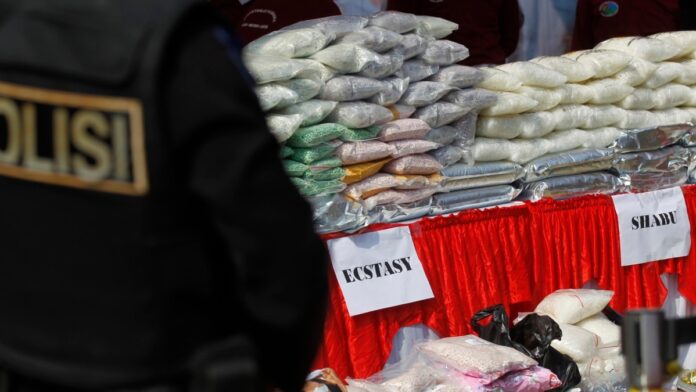Government Continues Efforts to Curb Spread of Drugs, Serious Threat to Young Generation
By: Andika Pratama)*
The government continues to strengthen strategic measures to curb the spread of drugs, a serious threat lurking in the young generation of Indonesia. The Head of the National Narcotics Agency (BNN), Commissioner General of Police. Marthinus Hukom, revealed that as many as 312 thousand teenagers are currently trapped in drug abuse. This figure reflects an emergency situation that requires integrated handling from all parties, including the government, society, and families.
The main factors of drug abuse among teenagers are curiosity and peer coaxing. Curiosity about illegal substances is often the gateway for many teenagers to try drugs. Ironically, once they get into it, they often find it difficult to get back on the right track. In many cases, addiction takes users further away from a healthy and supportive environment.
The Drug-Free Village Program (Desa Bersinar) initiated by the BNN is one of the concrete steps in preventing drug trafficking at the community level. This initiative aims to create a drug-free environment, by empowering the community to participate in education and supervision. The Head of the BNN emphasized the importance of the role of families in building early awareness about the dangers of drugs. Education that starts from home is believed to be able to become an early defense for the younger generation.
The digital era also presents its own challenges in the war on drugs. Technology, which should be a tool to spread positive information, is often used by criminals to market these illicit goods. Drug networks now use social media and digital applications to attract the attention of young people. The government and law enforcement must be more responsive in dealing with this new pattern of drug trafficking by adopting a technology-based approach.
In addition, handling of drug abuse in Indonesia often faces a dilemma between legal and rehabilitation approaches. Law Number 35 of 2009 concerning Narcotics, regulates that drug users who are victims of abuse can undergo medical and social rehabilitation, not criminal punishment. However, implementation in the field is often inconsistent. Many victims of drug abuse are actually imprisoned, making it difficult to get adequate access to rehabilitation.
Lampung Police Public Relations Chief Senior Commissioner Umi Fadillah Astutik emphasized the importance of public awareness of the dangers of drugs, especially for the younger generation. He also highlighted the role of the environment, family, and educational institutions in protecting children and adolescents from the dangers of drugs.
This paradox is a serious concern, because detention in prison actually worsens the condition of the victim. Many cases show that prison can be a fertile ground for drug trafficking, with some cases involving prison officers. This shows the need for reform of the law enforcement system to focus more on rehabilitation than punishment, especially for victims of drug abuse.
Efforts to eradicate drugs cannot be done partially. Head of BNNK Bantul, Arfin Munajah, stated that cross-sector collaboration is the key to the success of the drug prevention, eradication, abuse, and illicit trafficking (P4GN) program. Local governments, educational institutions, community organizations, and the private sector must join hands to create integrated strategic steps. A real example of this synergy is the formation of Desa Bersinar in various regions, which focuses on education and community empowerment.
On the other hand, the social stigma against drug users also needs to be removed. Many of them fall into drug abuse not because of a conscious choice, but because of vulnerable social, economic, or psychological conditions. This stigma often becomes a barrier for them to get the help they need. The government needs to encourage campaigns that promote empathy and support for victims, so that they feel accepted in society and motivated to recover.
Early prevention is the most effective step to break the chain of drug abuse. Education about the dangers of drugs must begin at an early age, both in the family and school environment. The education curriculum can include material about the negative impacts of drugs comprehensively. In addition, positive activities such as sports, arts, and skills can be an alternative for young people to channel their energy productively.
The threat of drugs not only destroys the future of individuals, but also has an impact on the sustainability of the nation. Young generations who become victims of drug abuse lose their potential to contribute to society. Therefore, handling drugs is not only the government’s task, but also the collective responsibility of all elements of the nation.
In this effort, the mass media has a strategic role to increase public awareness. The media can be a means to disseminate information about the dangers of drugs, support anti-drug campaigns, and oversee government policies in eradicating drugs. With an integrated approach and support from all parties, the threat of drugs can be suppressed, and the future of Indonesia’s young generation can be saved.
Through concrete steps such as cross-sector synergy, ededucation, and policy reform, the government has demonstrated its commitment to providing sustainable solutions. This struggle requires cooperation and active participation from the community. In this way, Indonesia can create a young generation that is free from drugs, healthy, and ready to build the future of the nation.
)* The author is a contributor to Jabartriger.com
